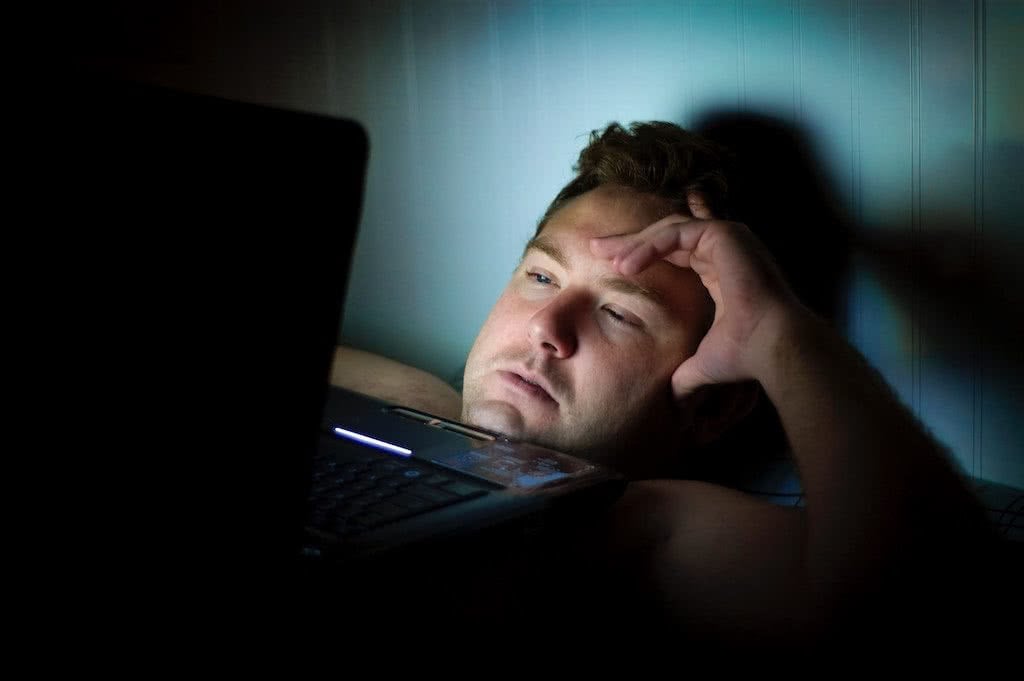How To Deal With Anxiety At Night When You’re Feeling Alone & Vulnerable

Anxiety never strikes at an ideal moment. It’s always a rude interruption to whatever else is planned. When it shows up in the middle of the night, while everyone else is asleep and you’re feeling vulnerable and alone, it can be a very unwelcome companion. It’s for moments like these that knowing how to deal with anxiety at night is so critical.
The truth is that dealing with anxiety at night is not that much different than doing so during the day, except for our sense of connection with others and fatigue. In the wee hours of the morning, chances are that those people you count on during the day are sound asleep. And because you care about them, you’re reluctant to wake them.
That means you’re left to deal with your anxiety on your own, and with a tired brain that may have trouble thinking clearly (and rationally). Luckily it is possible to calm your mind and your body by doing one or more of the following:
1. Go easier on yourself.
When it comes to knowing how to deal with anxiety at night, practicing self-compassion is one of the first tools to use. Self-compassion is not about abdicating or avoiding what you’re feeling. It’s about facing your experience, accepting your feelings without criticism or dread, and taking control. It’s about being as compassionate with ourselves as we would be to a loved one.According to Dr. Kristin Neff, self-compassion means that “we clearly acknowledge our problems and shortcomings without judgment, so we can do what’s necessary to help ourselves.”
In the middle of the night, when your anxiety has you feeling alone and vulnerable, being gentle with yourself so you can calm your anxiety is a great place to start.
2. Find ways to feel gratitude.
Gratitude and anxiety may not seem easily comingled, and they aren’t necessarily. Yet cultivating gratitude can help broaden our perspective, and thus offset the grip of anxiety when it strikes. Gratitude is not just about counting our blessings. It’s about digging further into our experienceof our blessings, the source of them, and the interconnectedness of us all. Gratitude can help pull us out of our immediate fears and add width and depth to our perception.It can help us remember we’re supported and affirmed by others. It also underscores a sense of connection that strengthens us – even in the middle of the night.
3. Draw your attention to the here and now.
Since anxiety is most often focused on the future and an experience yet to come, refocusing on the observable realities of the present can help dial down your distress. Grounding is a technique which involves attaching yourself to the here and now of your immediate environment. Grounding is about focusing on what’s right in front of you, like how the sheets feel on your skin or the light coming in the window.This technique brings awareness to the most concrete things in front of us and away from vicious cycles of thoughts inside our minds.
4. Embrace the positive.
Positive emotions can materially reduce negative ones. This fact is at the heart of this technique for how to deal with anxiety at night. Focusing on the positive aspects of whatever you are worried about, where ever the positive may be, can help limit the impact of your negative thoughts.If it seems too hard to generate positive emotions on your own when you’re struggling with anxiety, try some positive distraction. Watching a few minutes of your favorite comedy or scrolling through some cute animal videos can help give your mind the positive boost it needs to reset itself.
5. Just breathe.
It turns out that Anna Nalick had it right in her song Breathe (2 am). One of the most effective things you can do to physically calm your nervous system is to calm your breath.When we are anxious and feel threatened, controlled breathing has been shown to activate the parasympathetic branch of the nervous system that helps turn off the stress response.
Simple exercises to lengthen and slow our breath can have a powerful effect on increasing our cognitive capabilities, which in turn help regulate our emotions. And when you can think more clearly, it’s a clear sign your anxiety is abating.
Each of these techniques can be powerful in helping you deal with anxiety at night, but trying them all will help you determine which ones work best for you. You may find that one is more effective for you than another, or that you use them all. There is no best way to use these strategies.
The key is to have these five tools at the ready for when you find yourself awake and anxious, looking for help. Strategies allow us to take control more easily, so that the time we spend awake feeling anxious, alone, and vulnerable will be as short-lived as possible.
For more help managing anxiety, check out my new book, Hack Your Anxiety, register for my free mini-ecourse by signing up for book bonuses here, or check-out my anxiety and relationships blogs.
Photo by Matthew T Rader on Unsplash
Thanks.